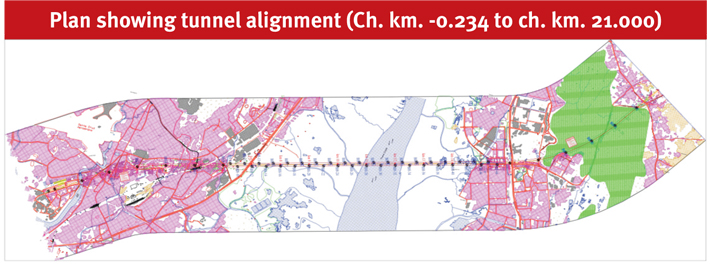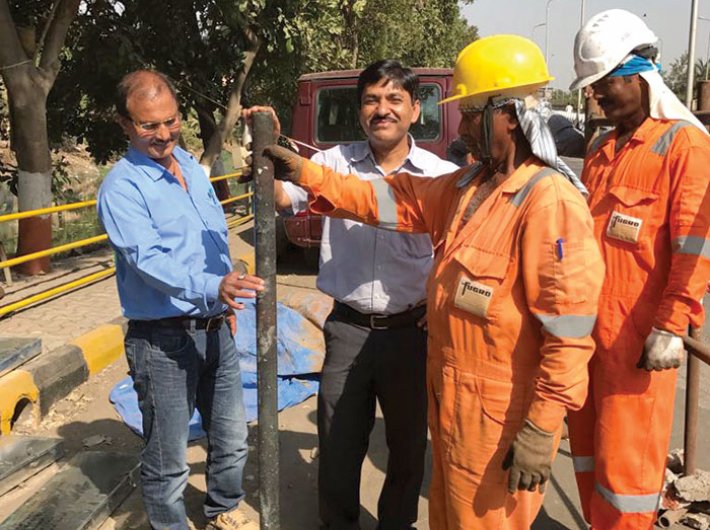Work on India’s first undersea rail tunnel – part of the bullet train project – has begun with a testing
The bullet train, the big-ticket headline-grabbing project now firmly under way, includes an engineering marvel: the country’s first undersea rail tunnel. It will come up just north of Mumbai, near Thane Creek.
The National High Speed Rail Corporation Limited (NHSRC), the implementing agency for the Mumbai-Ahmedabad high speed rail corridor, completed ‘static refraction testing’ for the undersea tunnel on December 24. The test involved firing high-energy sound waves towards the seabed from below the surface of the water and mapping the resultant refracted sound waves to determine the density of the rock under the seabed.
To ascertain soil strength, exploration for undersea tunnel was carried out 70 metres below ground level. As many as 66 bore holes with a gap of 250 metres between each pair have been drilled in a staggered fashion (that is, alternating diagonally) on its alignment with Japanese jack-up well equipment. Soil strength has turned out to be good and now construction will be carried out 40-45 metres below the seabed.
“Only a very dense rock can safely support a tunnel of the present nature. The study has now been taken to Tokyo. After its analysis by Kawasaki Geological Engineering Co and Indian Geotechnical Services the findings will be available by second week of January. Thereafter, Japan International Consortium for Transportation Co. Ltd. (JIC) will do the designing of the underground corridor,” says UP Singh, chief project manager, NHSRC.
Seven km out of the 21 km of the twin-track underground tunnel will pass under the seabed, mangroves and marshlands on either side of the creek. A stretch of 1.8 km of these seven kilometres will be constructed under the seabed. NHSRC and RITES, a railway ministry organisation, have also completed the survey of mangroves around the creek using the light detection and ranging (LIDAR) scanner, a data recorder and other equipment with a 100 megapixel camera. This aerial-survey method provides accurate data about land contours, buildings and vegetation.
The project corridor will begin at the underground station in the Bandra-Kurla Complex (BKC) in Mumbai and then traverse 21 km underground within seven-eight minutes before emerging above ground near Shilphata Diva Naka. It will end at the Sabarmati station in Ahmedabad.
According to NHSRC, a 100-member design team is working on tweaking the engineering of Japan’s Shinkansen technology to make it work in Indian conditions.
The prime minister’s office (PMO) has sought weekly updates on the progress of the project, and engineers are working round the clock to ensure that prime minister Narendra Modi’s ambitious project is implemented on time, says Singh.

Plans are being prepared by JIC and construction is expected to start in the third quarter of 2018 with tunnelling work, execution of stations and construction of bridges. Three tunnel-boring machines will be deployed. Ventilation shafts will be put up at every 7.5 km of the tunnel to give an outlet for fumes emitted by the bullet train. The shafts will also be used for transporting out debris and muck generated due to digging which will be recycled by environmental consultants.
“With the 21-km tunnel going underground, problems of relocation will not arise, but old buildings en route will have to be strengthened,” adds Singh.
Meanwhile, relocation of utilities is going on and NHSRC is setting up a High Speed Railway Training Institute in Vadodara. The institute will provide training for systems and maintenance operations to the personnel, beginning with 4,000 staff members.
The Rs 1,10,000 crore project is expected to be a reality by August 15, 2022 – the 75th Independence Day. The underground tunnel construction is estimated to cost Rs 3,500 crore.
geetanjali@governancenow.com
(This article appears in January 31, 2108 edition)

